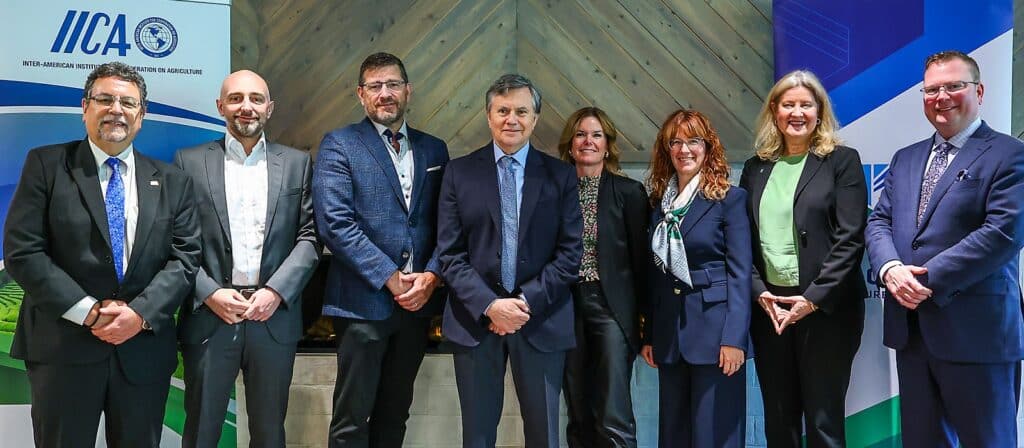
Calgary, Alberta, Canada, 18 June 2025 (IICA) – Leaders from the agricultural sector around the world, officials from international organizations, representatives of the private sector, academics and students gathered in Canada to highlight the growing importance of agriculture for the future of humanity and called for cooperative efforts to address the challenges facing the planet.
The first Americas Agriculture and Food Security Forum, organized by the Inter-American Institute for Cooperation on Agriculture (IICA) with support from the International Fund for Agricultural Development (IFAD), took place in the Canadian province of Alberta alongside the G7 Summit, which brought together heads of state and government from the world’s most advanced economies.
IICA Director General Manuel Otero was one of the speakers at the forum, which was held over two days at Olds College of Agriculture and Technology, a leading agricultural university in Canada. The college has students from 36 countries and a 1,500-hectare campus that includes a smart farm and a high-tech laboratory for agricultural research.
“Cultivating tomorrow’s food security and agriculture today” was the title of the event, which aimed to place agriculture on the public agenda as part of the solution to global challenges, at a time when the G7 Summit was drawing worldwide attention to Alberta.

Manuel Otero, Director General of IICA.
The event, which celebrated the daily work of farmers, featured over 50 speakers who discussed topics such as the role of science and innovation in agricultural transformation, public policy design, trade and integration, carbon markets, and soil health.
Jason Hale, Alberta’s Deputy Minister of Agriculture and Irrigation; Debbie Thompson, President of Olds College; and Gerardine Mukeshimana, Vice President of IFAD, participated in the forum’s opening ceremony alongside Manuel Otero and IICA’s Representative in Canada, Jean-Charles Le Vallée.
During the event, Canadian Senator Mary Robinson was recognized as a Leader of Rurality of the Americas. Robinson is a former President of the Canadian Federation of Agriculture (CFA), which represents about 200,000 farmers in the country, and currently serves as Vice President of the World Farmers’ Organisation (WFO).
Robinson is a sixth-generation farmer from Prince Edward Island, in eastern Canada.
“It’s a great honor to be recognized by IICA, as agriculture is at the heart of my life in many ways. We must make it clear that agriculture is vital for global prosperity and peace. It is essential that farmers remain in rural areas, providing food, fuel, and fiber for humanity,” said Robinson.
THE CHALLENGES OF AGRICULTURE
“We must be aware that without agriculture, there is no food. Alberta is fundamentally an agricultural province; agriculture is our oldest industry and still a key one. Farmers continue to work hard, despite increasingly difficult challenges, from droughts to rising production costs. That’s why we’re making major efforts to invest in the infrastructure farmers rely on,” said Jason Hale on behalf of Alberta’s provincial government.
“We could not imagine a better time and place for this meeting on sustainable agriculture than when G7 political leaders are gathered nearby. We are strongly committed to the resilience and well-being of farmers,” said Debbie Thompson, President of Olds College. She noted that technologies are transforming agriculture and pointed to climate variability, trade barriers, and labor shortages as the sector’s main challenges.
“We have a special responsibility as a continent, so we must be more united. The diversity of the Americas is not a weakness; it is our strength. Agriculture has an irreplaceable role: boosting productivity and competitiveness. That’s always been the case and will continue to be so,” said IICA Director General Otero.
Otero emphasized that one in every three food products traded globally comes from the Americas, making the region a guarantor of both global food security and environmental sustainability. He stressed that agriculture must now transform itself to face multiple crises, recalling that in other historic periods of great hardship, such as world wars or the Great Depression, agriculture always rose to the occasion.
The IICA Director General also praised the role of farmers: “They are not only producers, but also guardians of the land and custodians of biodiversity. They must be fairly compensated, have access to financing, and benefit from sound public policies,” he concluded.
Otero shared a panel with Zulfikar Mustapha, Minister of Agriculture of Guyana and chair of the CARICOM ministerial group on food security.
“I have witnessed how the agricultural sector has transformed in recent years through sustainable practices and the adoption of new technologies, which are giving us new opportunities despite the difficulties. Today, it’s possible to increase productivity while also protecting the environment,” said Mustapha.

Jean-Charles Le Vallée, IICA Representative in Canada
The Guyanese minister stressed the importance of the public sector: “If we want farmers to produce more and end hunger, governments must take bold action. Agriculture needs to change to adapt to harsher conditions, and rural communities need better public policies.”
Mrs. Mukeshimana from IFAD stated that food security is under increasing pressure due to armed conflicts, climate change, and economic crises, and called for joint action: “Now is the time for greater collaboration and action not only among countries but across sectors, including universities, the private sector, and civil society. We must invest in practical solutions to preserve our agrifood systems. We’ve already shown that we can work together in times of great need.”
More information:
Institutional Communication Division.
comunicacion.institucional@iica.int











